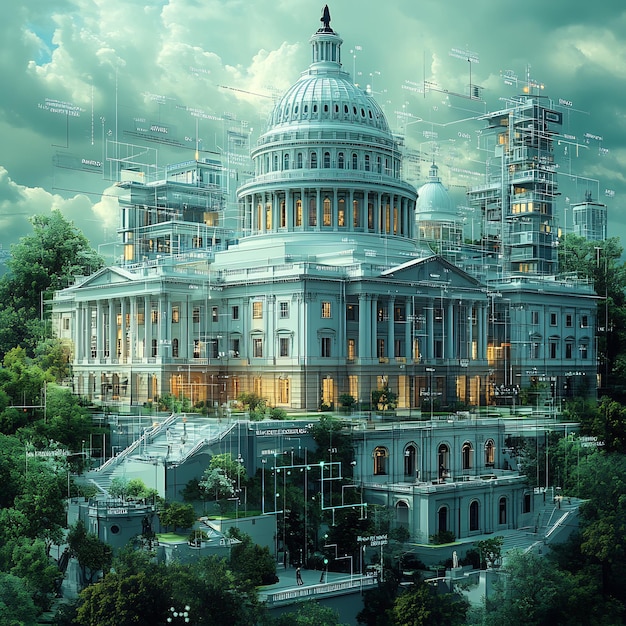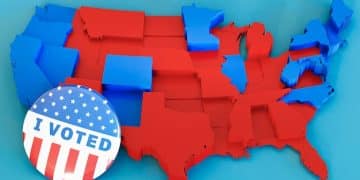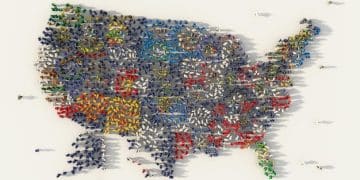How the 2028 US Election Could Reshape Policy

How Will the US Election Cycle in 2028 Impact Policy Decisions? The approaching 2028 US election is poised to significantly influence potential policy shifts across various sectors, including healthcare, environmental regulations, and economic strategies, based on the priorities of the candidates and the prevailing political climate.
The United States is already bracing itself for the upcoming 2028 election cycle. With political landscapes constantly shifting, understanding how will the US election cycle in 2028 impact policy decisions? becomes crucial.
This article will delve into potential policy shifts across different sectors, helping you stay informed about the future direction of American governance.
Understanding the Political Landscape Leading to 2028
To understand how the 2028 election will impact policy, it’s important to first look at the existing political landscape. Current legislative trends and public sentiment play critical roles in shaping the agendas of potential candidates.
Major Legislative Trends
Several key legislative trends are shaping the political environment:
- Healthcare Accessibility: Debates around affordable healthcare continue to be at the forefront.
- Environmental Regulations: Stricter environmental policies are being proposed to combat climate change.
- Economic Policies: Discussions on tax reforms and economic stimulus packages are ongoing.
These legislative trends not only reflect current priorities but also foreshadow the main battlegrounds for the 2028 elections. How will the US election cycle in 2028 impact policy decisions? The answer lies in the platforms of the candidates who aim to address these issues.

Public Sentiment and Key Issues
Public sentiment significantly influences which issues gain traction during election years. Key issues include:
- Economic Stability: Job creation and wage growth remain top priorities for many voters.
- Social Justice: Issues related to racial equality and criminal justice reform are gaining momentum.
- National Security: Concerns about cybersecurity and geopolitical threats impact voter decisions.
Public perception of current policies, combined with emerging social and economic issues, sets the stage for the policy debates of 2028. Understanding these dynamics is crucial in forecasting how will the US election cycle in 2028 impact policy decisions?
In conclusion, the existing political landscape, shaped by legislative trends and public sentiment, provides the foundation upon which the 2028 election cycle will influence future policy decisions.
Forecasting Potential Policy Shifts in Healthcare
Healthcare is always a central issue in U.S. elections. A significant policy shift in healthcare could be on the horizon, with candidates likely to propose varying approaches to healthcare accessibility, affordability, and quality. Examining possible changes is key to understanding how will the US election cycle in 2028 impact policy decisions?
Expanding Healthcare Access
Potential policies on this include:
- Universal Healthcare: Proposals for a single-payer system may resurface, aiming to provide coverage for all citizens.
- Affordable Care Act (ACA) Modifications: Candidates may suggest reforms to the ACA to improve its effectiveness and address shortcomings.
- Medicaid Expansion: Further expansion of Medicaid eligibility could be considered to cover more low-income individuals and families.
The debate over healthcare access will likely shape the contours of the 2028 election, impacting the lives of millions of Americans.
Policy Impact on Pharmaceutical Regulations
Pharmaceutical regulations are another critical area that will likely see significant debate.
- Drug Pricing: Policies aimed at lowering prescription drug costs may gain traction.
- Generic Drug Competition: Encouraging competition among generic drug manufacturers could further drive down prices.
- Importation of Drugs: Allowing the importation of drugs from other countries could provide more affordable options for consumers.
The outcome of these debates could have a direct impact on healthcare costs and outcomes.
Therefore, healthcare continues to be a critical battleground where the 2028 election offers possibilities for reshaping healthcare policies.
Environmental Regulations: A Pivot Point in 2028?
Environmental regulations are under constant scrutiny. The 2028 elections present a critical juncture where policy changes in this area could either accelerate or decelerate based on the election results.
Renewable Energy Incentives
Incentives for renewable energy will remain a key debate point.
- Tax Credits: Extending or expanding tax credits for renewable energy projects can spur growth in the sector.
- Subsidies: Direct subsidies for renewable energy technologies can make them more competitive.
- Research Funding: Increased funding for research and development can accelerate the deployment of new energy technologies.
These strategies are vital for promoting a sustainable transition to cleaner energy sources.
Regulations on Emissions
Stringent emission regulations are essential for mitigating climate change.
- Carbon Tax: Implementing a carbon tax can incentivize businesses to reduce their carbon footprint.
- Fuel Efficiency Standards: Raising fuel efficiency standards for vehicles can decrease emissions from the transportation sector.
- Regulations on Methane Emissions: Targeting methane emissions from oil and gas operations can significantly reduce greenhouse gas emissions.

These measures are crucial for achieving long-term environmental sustainability.
Conservation Efforts
Conservation efforts must be part of this comprehensive approach. Policies include:
- Protecting Natural Habitats: Designating more areas as protected zones can preserve biodiversity.
- Investing in Restoration: Funding projects to restore degraded ecosystems can enhance resilience.
- Promoting Sustainable Agriculture: Encouraging farming practices that minimize environmental impact.
How will the US election cycle in 2028 impact policy decisions? The emphasis on conservation efforts will depend significantly on the political will of the elected officials.
With environmental regulations being a fundamental subject, the 2028 elections will certainly define the trajectory on this matter in years to come.
Economic Policy: How Will the US Election Cycle in 2028 Impact Policy Decisions?
Economic policy remains a crucial and contentious issue in American politics. The 2028 election cycle is poised to bring significant debates and potential shifts in economic strategies. The outcomes of these elections could set the tone for fiscal policy, trade agreements, and regulatory oversight for years to come.
Tax Reforms and Fiscal Policy
One of the central economic debates in the 2028 election cycle will likely revolve around tax reforms and fiscal policy.
- Tax Cuts for Corporations and Individuals: Some candidates may advocate for further tax cuts, arguing that they stimulate economic growth by encouraging investment and job creation.
- Progressive Taxation: Others may propose a more progressive tax system, where higher earners pay a larger percentage of their income in taxes, to fund public services and reduce income inequality.
- Fiscal Responsibility: All candidates will likely address the issue of national debt and fiscal responsibility.
Changes to tax laws and government spending can have immediate and long-lasting effects on the national economy.
Trade Agreements and Global Economics
Trade agreements and global economic policies are another critical area where the 2028 election could bring significant changes.
- Trade Protectionism: Some candidates may favor protectionist policies, such as tariffs and import quotas, to protect domestic industries from foreign competition.
- Free Trade Agreements: Others may champion free trade agreements, arguing that they lower prices for consumers, increase exports, and promote economic growth.
- International Cooperation: Depending on the election results, the U.S. could either strengthen or weaken its relationships with international economic institutions.
The stances that candidates take on trade and global economics will have implications for the competitiveness of American businesses.
Economic policies are a significant determinant of the future health and security of the U.S.
Social Policies: Potential Changes in 2028
Social policies are often at the forefront of electoral debates. The 2028 elections could bring about significant changes, with candidates proposing different approaches to education, criminal justice reform, and social welfare programs.
Education Reform
Education reform is a key issue that often sees renewed focus during election years.
- School Choice: Policies promoting school choice, such as vouchers and charter schools, may be debated as ways to improve educational outcomes.
- Funding for Public Schools: Proposals to increase funding for public schools, particularly in underserved communities, are likely to gain prominence.
- Higher Education Affordability: Addressing the rising costs of higher education may also be a priority.
Different approaches to education can have lasting impacts on the future workforce.
Criminal Justice Reform
With growing awareness of inequalities in the justice system, criminal justice reform is another critical issue.
- Sentencing Reform: Policies aimed at reducing mandatory minimum sentences and reforming drug laws may be considered.
- Policing Reform: Proposals to improve police training, increase accountability, and reduce incidents of police brutality are likely to be debated.
- Rehabilitation Programs: Investing in rehabilitation programs for former offenders can help reduce recidivism rates.
These have potential to make a substantial difference in communities across the country.
Social Welfare Programs
Social policies always spark lively debate. The way forward depends entirely on the priorities identified by candidates.
- Safety Net Programs: Candidates may debate the appropriate level of funding and eligibility requirements for these programs.
- Universal Basic Income: Some progressive candidates may propose a UBI as a way to combat poverty and income inequality.
Ultimately, the social policies chosen by the next administration will reflect society’s priorities regarding well-being.
Geopolitical Strategies: The US Role in 2028
Geopolitical strategies dictate the US role in global affairs. The 2028 election cycle is set to influence these strategies significantly, impacting relationships with allies, approaches to global conflicts, and international trade.
Alliances and International Relations
The next administration will likely need to reassess and redefine the US’s key alliances.
- Strengthening Traditional Alliances: Some may advocate for reinforcing alliances with countries in Europe, Asia, and the Middle East.
- Building New Partnerships: Others may focus on forging new partnerships with emerging economies and regions.
- Diplomacy and Conflict Resolution: The approach to international conflicts will also be a critical issue.
How will the US election cycle in 2028 impact policy decisions? Maintaining a strong and stable network of alliances is crucial for global security.
Defense Spending and Military Strategy
Debates over defense spending and military strategy are almost guaranteed during the 2028 campaign.
- Modernizing the Military: The focus on modernizing the US military will likely continue, but with varying priorities.
- Cybersecurity and Information Warfare: Investing in cybersecurity capabilities and defending against information warfare will remain a top concern.
- Balancing Traditional and Asymmetric Threats: Policies must strike a balance between addressing traditional military threats and emerging asymmetric challenges.
The direction chosen will have profound implications for global stability.
Global Trade and Economic Partnerships
Trade and economic partnerships have consequences for the balance of power.
- Trade Agreements: Candidates may propose renegotiating existing trade agreements or forging new ones.
- Economic Sanctions: Imposing economic sanctions can be a powerful tool for influencing other countries’ behavior.
- Promoting American Economic Interests: Policies aimed at promoting American economic interests in the global arena will be a key focus.
Overall, geopolitical considerations are vital in understanding the influence of the 2028 elections.
| Key Point | Brief Description |
|---|---|
| 🗳️ Healthcare Access | Potential policy shifts in healthcare accessibility and affordability. |
| 🌱 Environmental Regulations | Examination of renewable energy incentives and emission regulations. |
| 📈 Economic Policy | Discussions around tax reforms, trade and international cooperation. |
| 🤝 Geopolitical Strategies | The US’s role in alliances and international relations. |
Frequently Asked Questions
The 2028 election could lead to significant reforms in healthcare, including changes to the Affordable Care Act, drug pricing regulations, and Medicaid expansion, depending on which party gains control.
Environmental regulations regarding renewable energy incentives, emission standards, and conversation efforts may change drastically based on the elected officials’ stance on climate change and environmental sustainability.
The new administration elected in 2028 could renegotiate existing trade agreements or establish new ones, impacting international trade relations and domestic industries, as well as global cooperation towards economic partnership.
The availability and funding of social programs, such as SNAP, TANF etc., could see revisions depending on the party in power, either emphasizing expansions to broaden the safety net or prioritizing reforms.
The 2028 election could lead to shifts in US foreign policy, with the new administration reassessing existing alliances, building new partnerships, or altering approaches to global conflicts and international diplomacy.
Conclusion
In conclusion, the how will the US election cycle in 2028 impact policy decisions? presents various potential shifts across sectors like healthcare, environment, economy, social policies and geopolitical strategies. Staying informed and engaged is crucial for navigating the upcoming changes.
By understanding the possible outcomes and their implications, citizens and stakeholders can better prepare for the future direction of American governance.





